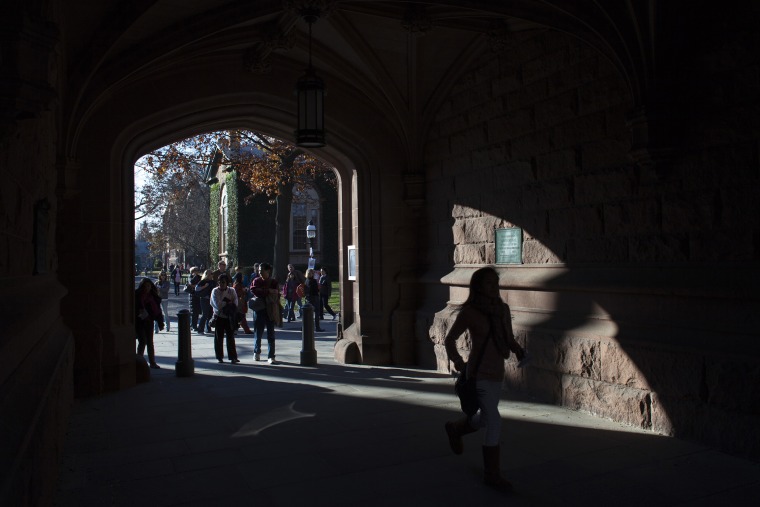As an increasing number of colleges face criticism from both politicians and public for not doing enough to combat sexual assault on campus (a new study reveals 41% of colleges have not conducted a sexual assault investigation in the last five years) school representatives, students and experts met to discuss the issue at Dartmouth's Summit on Sexual Assault last week.
Read Meredith Clark's report from the Dartmouth conference and take a look at some of the responses the author had to questions and comments from the msnbc.com community.
jppcasey1: I don't fully understand the concept here. If you're raped, regardless of where, shouldn't the police be called immediately? Why, if it happens on a campus, is the school allowed to interfere with a criminal investigation?
Meredith Clark: No one is required to report crimes to law enforcement, on or off of college campuses. Schools have a responsibility under Title IX to investigate reports of assault, and are required to report crime statistics under a law called the Clery Act. Schools conduct separate investigations, that do not carry criminal penalties, but that can lead to academic penalties such as suspension or expulsion. A lack of communication between schools and local police, a lack of understanding of community resources for survivors, and poor training for school and law enforcement can lead students who report assaults to campus counselors, RAs, or other school officials without accurate information about their options.
John-3353345: What does Title IX have to do with unrelated crimes by intervening 3rd parties?
Meredith Clark: Schools are required to conduct an investigation into all reported sexual assaults under title IX, and if a student feels the investigations were not done properly or were influenced unfairly, they can file a complaint. Title IX governs gender equity in educational opportunities, so any school, from kindergarten through universities, must make sure that students are not prevented from accessing education. The government has ruled that schools have a responsibility to make sure that victims of sexual assault and some other crimes do not see their educations suffer because the schools did not adequately accommodate them to ensure security and care after an assault.
"Finding a balance between community safety and obligations to individual survivors is much more complicated than just stiffening penalties for those found responsible by a university disciplinary committee."'
relentless70: Sexual assault is a crime, no matter where it occurs. Criminal behavior is handled by the justice system beginning with a police investigation that should commence as soon after the crime is committed as possible. Any educational institution that slows or interrupts this process is more interested in its own reputation than it is in the care and safety of its students or law and order.
Meredith Clark: One of the challenges as schools deal with how to protect the civil rights of students, without taking over for the criminal justice system, is how to partner with police departments that might also be staffed by individuals with biases or incorrect assumptions about how to conduct a sexual assault investigation. Some schools have agreements, called Memorandums of Understanding, with police departments, but not all do. And victims of assault need to be allowed to make decisions about how to proceed, whether it's pressing charges or asking to not have to see a perpetrator in class, without pressure. Finding a balance between community safety and obligations to individual survivors is much more complicated than just stiffening penalties for those found responsible by a university disciplinary committee.
42AMO: The real difficulty in this discussion is that the colleges and universities operate in a culture that does not do an adequate job in responding to sexual assaults. It is particularly a problem when the person accused of the assault is known to the person assaulted. We need to stop making that assumption that familiarity implies consent.
Meredith Clark: Statistically, it is the norm for victims of sexual assault to know their perpetrators, but many if not most people either don't know or don't believe that. Many trainings aimed at school employees and at students are aimed at shattering myths surrounding sexual assault -- that stranger rape is "real" and acquaintance rape is not, that the presence of alcohol or drugs means a victim deserved it -- but the cultural messages are powerful.
This is why many survivors call for better investigations and stronger penalties - prevention efforts can only do so much without demonstrated consequences. But getting a case all the way through a disciplinary or criminal process requires officials who don't buy into those cultural tropes. Does one have to come before the other, or can they be done together?
trolling-8898236: If law enforcement can't find enough evidence to press charges and the victim doesn't even have enough evidence to go to civil court then what is the school to do?
Meredith Clark: Even with "troll" in your handle, you bring up a point that is widely misunderstood. Many students report being assaulted to someone at their school first, and if a young woman or man decides they do not want to go through the criminal justice system -- most survivors decide not to, because of the same biases and misconceptions surrounding sexual assault that plague college campuses -- it is still a school's legal responsibility to protect that student's safety and ability to learn.
See all of the author's discussion with the msnbc.com community here.
(Some comments have been edited for length.)
